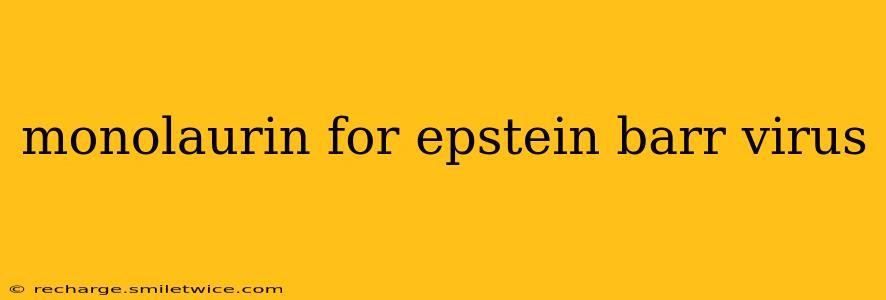Epstein-Barr virus (EBV), a common herpes virus, infects the majority of adults worldwide. While usually asymptomatic, in some individuals, EBV can lead to a range of health issues, from mononucleosis ("mono") to more serious conditions like certain cancers. This has spurred interest in natural remedies, including monolaurin, a compound derived from lauric acid found in coconut oil. But does monolaurin truly offer a solution for EBV? Let's explore the evidence and what the science actually says.
What is Monolaurin?
Monolaurin is a monoglyceride of lauric acid, a saturated fatty acid predominantly found in coconut oil. It's believed to possess antiviral, antibacterial, and anti-inflammatory properties. Proponents suggest that its mechanism of action involves disrupting the lipid membranes of viruses, effectively preventing their replication and spread. This makes it attractive as a potential treatment for viral infections like EBV.
Does Monolaurin Kill Epstein-Barr Virus?
This is the crucial question, and unfortunately, the answer isn't a simple yes or no. While laboratory studies have shown that monolaurin demonstrates in vitro antiviral activity against some viruses, there is limited clinical evidence to support its effectiveness against EBV in humans. Much of the current information is based on anecdotal reports and preclinical research, not large-scale, controlled human trials. Therefore, we cannot definitively state that monolaurin kills EBV in humans.
What are the limitations of current research on monolaurin and EBV?
Many studies exploring monolaurin's antiviral effects have been conducted in vitro—that is, in a laboratory setting, using cells grown in a petri dish. These studies show promise, but they don't always translate to the same effects in a complex living organism. The human body possesses a sophisticated immune system, and factors like individual immune responses, dosage, and method of administration can significantly influence a compound's efficacy. Furthermore, the lack of robust clinical trials specifically investigating monolaurin's effect on EBV makes it difficult to draw definitive conclusions.
Can Monolaurin Help Manage EBV Symptoms?
While the evidence supporting monolaurin's direct antiviral action against EBV in humans is limited, some people report that it helps manage symptoms associated with EBV reactivation or chronic EBV infection. These reported benefits might be linked to monolaurin's potential anti-inflammatory properties. Chronic fatigue, one common symptom of EBV, could potentially be alleviated by reducing inflammation. However, it's crucial to understand that any perceived symptom improvement may be due to other factors or the placebo effect.
What are the side effects of monolaurin?
Generally, monolaurin is considered safe for consumption at recommended dosages. However, some individuals might experience mild digestive upset, such as diarrhea or nausea, particularly with high doses. As always, it's important to consult with a healthcare professional before using monolaurin, especially if you are pregnant, breastfeeding, have underlying health conditions, or are taking other medications.
Is Monolaurin a Cure for Epstein-Barr Virus?
No, there is currently no cure for Epstein-Barr virus. While monolaurin shows promise in preclinical studies against some viruses and may offer some symptomatic relief for some individuals, it is not a proven cure for EBV.
What are other natural approaches for managing EBV?
Managing EBV often involves supporting the immune system and addressing symptoms. This can include:
- Stress reduction techniques: Chronic stress can trigger viral reactivation. Practices like yoga, meditation, and deep breathing can be beneficial.
- Adequate sleep: Sufficient sleep is essential for immune function.
- Nutritious diet: A balanced diet rich in fruits, vegetables, and whole grains supports overall health.
- Regular exercise: Physical activity boosts the immune system.
Conclusion
Monolaurin is an interesting compound with potential antiviral properties, but more rigorous research, particularly large-scale human clinical trials, is needed to determine its effectiveness against Epstein-Barr virus. While it may offer some symptomatic relief for some individuals, it is not a cure and should not replace conventional medical care. Always consult a healthcare professional before using monolaurin or any other natural remedy to manage EBV or other health conditions. They can help determine the best course of action based on your individual health needs and circumstances.
